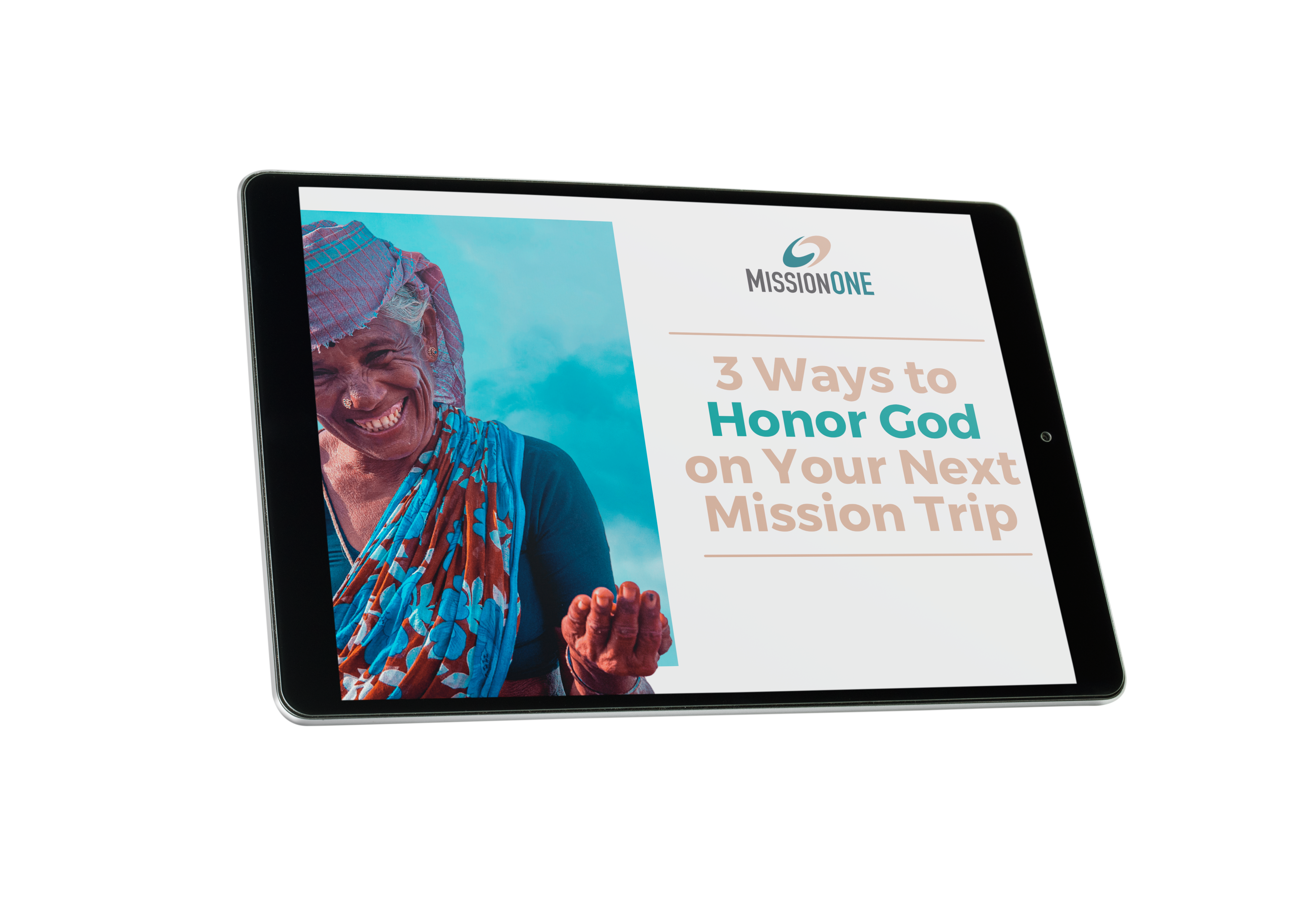It should come as no surprise that the topic of identity is considered one of the most talked about among Christian and secular circles alike. It’s in our nature to be curious about who we are, and find our purpose—whether that question comes up today, or in the future.
Not only does our identity play a role in how we behave toward one another, and helps dictate the decisions we make, it also ties us to our community and belief systems. If our identity is challenged, our entire way of life can be impacted.
In other words, our identity shapes every single aspect of our lives.
If we look at a formal definition of identity we see: ‘an individual’s sense of self defined by either a set of physical, psychological, and interpersonal characteristics that is not wholly shared with any other person; as well as a range of affiliations (e.g., ethnicity) and social roles.’ But, to further understand how identity may be shaped, we sat down with Mission ONE’s Theologian-in-Residence, Jackson Wu, to discuss how identity can be impacted by external forces such as stereotypes.
Identity and Stereotypes
Q: Why do stereotypes matter when it comes to identity?
JW: After a few years in the States (after 15 years living in Asia), I’m still stunned and grieved by Americans’ insistence that no one “label” them. North Americans (and some Europeans maybe) have an utter obsession with avoiding putting people in categories even though many of them are mere descriptors of identity. We are all stereotypical in some way. I believe all of us fit into several different boxes (maybe considered stereotypes) and that’s ok!
Q: Why are we so afraid to be put in specific boxes or allow stereotypes?
JW:The frantic fear that one might appeal to a stereotype seems rooted in some idolatry that I haven’t quite named, although I have heard some reasons like “not everyone fits the stereotype…I’m more than a label…putting people in a box is disrespectful… stereotypes can be abused,” and so on.
This tension over stereotypes is very closely tied to the question of identity. Americans are polarized about how they identify themselves. They are unsure about which way to go… whether expressive individualism or full-on group identification. For some people, being like others makes them feel dirty or tainted. It’s as if they’re degraded as individuals. Stereotypes expose their mirage of uniqueness.
Q: Are any labels or stereotypes accepted at all?
JW: Yes, some people fully embrace group labels such as “Black…gay…female…Republican,” etc. It’s this group of people who’s objections to stereotypes often are intellectually inconsistent. Negative characterizations are “obvious” insults to the group and thus each member’s worth. However, positive stereotypes are embraced and celebrated.
While people are quick to remind us of exceptions (when it comes to negative stereotypes), few point out the exceptions to the positive comments.
Q: Why the heightened offense of stereotypes, then?
JW: Francis Fukuyama’s observation provides a key clue. He writes: “But with the rise of these social movements, many people naturally came to think of their own aims and objectives in terms of the dignity of the groups of which they were members” (Identity, 123).
In other words, it’s increasingly true that individual honor is embedded in group honor. (Of course, this has always been true, but Americans are more sensitive to this dynamic.)
Q: Tell us more about this relationship between stereotypes and identity.
JW: Sure. How we talk about identity—and thus stereotyping, depends in part on the disciplines we draw from. For instance, my friend Brandon raised a good point in a recent tweet. He said:
“I find it very interesting that contemporary philosophy and theology tends to emphasize the profoundly atomized and individual nature of human identity while contemporary sociology and psychology appear to emphasize the deeply embedded and relational nature of identity.”
Q: Then, how often do our concepts of philosophy and theology contradict our understanding of ourselves as social and psychological beings?
JW: Well, we must acknowledge an obvious point: anything can be misused or abused, whether stereotypes or even the teaching that God loves us. Our brains need to make quick predictions about the world to help us survive. Stereotypes are a function of the “predictive brain.” and that means that such generalizations free the mind up to process the vast amount of information we take in daily. Stereotypes are comparable to a “representativeness heuristic.”
Q: Can you share an example of this?
JW: Yes. “Real Clear Science” summarizes an argument from Daniel Kahneman’s book Thinking Fast and Slow.
“If there were two cab companies in a city — Green and Blue, both with an equal number of cabs — and you were told that Green cabs are involved in 85% of cab accidents, which company would you choose to ride with? You’d obviously choose Blue, and, additionally, you’d almost certainly reach a conclusion that Green drivers must be a ‘collection of reckless madmen’…You have now formed a stereotype of Green recklessness, which you apply to unknown individual drivers in the company,” Kahneman writes.
Q: Can one assume, then, that stereotypes are not so bad after all?
JW: People don’t want to admit it but not only are stereotypes not going anywhere, even Psychology Today admits, “stereotypes are usually accurate.” I know—not always, but most stereotypes exist for a reason. General patterns of group behavior exist. That’s part of what makes one group distinct from another.
Q: So, how do we make sure stereotypes shape what we do in a positive way?
JW: Well, stereotypes themselves are not bad; discrimination based on stereotypes is. When it comes to speaking about cultures, people sometimes “generalize” rather than stereotype. Again, without the ability to speak in broad terms, we are hindered from discussing patterns found within a culture, including our own culture.
Q: Can you walk us through an example of this connection with culture and stereotypes?
JW: Of course. See, we are selective about stereotype outrage. Let me share a story to help illustrate what I’ve described. I recently worked with a friend creating a video. The professional videographer used cartoon characters representing people from around the world. I commented that the characters on one screen looked Anglo, not Asian. My friend then asked, “How do we make them more Asian without falling into stereotypes?”
My response was two-fold. First, “If they don’t look a certain way, they are hardly likely to be East Asian.” That’s just a simple fact of the genetics of people from certain regions of the world. Second, I said to her, “Notice how you did not complain about the stereotypical depictions of white people in the video.” She hadn’t thought about that. We all have stereotypes; we are selective about what we get mad about.
Q: Is it wrong to presume others will find stereotypes offensive? What can we do to help us move forward on this slippery slope?
JW: Well, it’s primarily Westerners who obsess about the slippery slope of stereotypes. In my years in East Asia, I found that Chinese routinely assumed stereotypes about them and others to be givens. Numerous times, I heard comments like, “We are yellow. Africans are black. Westerners are white…Americans have big eyes…Westerners are too independent,” and “Americans smell like sour milk.”
My point is not to approve or criticize such remarks. I note them to remind people both of the ubiquity of stereotypes and that they emerge from social experiences. We know that “American” does not imply any skin color. America is a cultural jigsaw puzzle.
Q: What are some last thoughts to share on the topic of stereotypes and identity?
JW: Diversity is not something everyone experiences. In non-Western contexts, where conformity is a value, few think it wrong to make generalities. They are more comfortable with stereotypes; they might say, how we’re the same is more important than how we’re different.
To learn more on this topic you can read Jackson Wu’s article titled: “Yes, we stereotype. So now what?” linked here.
Mission ONE has the privilege to work alongside amazing partners across the globe every single day and help empower and create opportunities through the Global Church. In doing so, we are helping communities experience the love of God first-hand and be more like the Kingdom.
When we utilize our God-given resources, gifts and talents and work together for the good of all peoples, we see true hope and experience life-changing transformation.
Join us, and learn more about how you can take part in making an impact today.
Give today and helps us share the gospel of Christ and restore humanity to all peoples.
Search the Blog
Free Resource

3 Ways to Honor God on Your Next Mission Trip
We're sharing three things you should consider before you organize or participate in an international mission trip, seek to do work in the multicultural neighborhood in your own city, or embark on any cross-cultural partnership.

